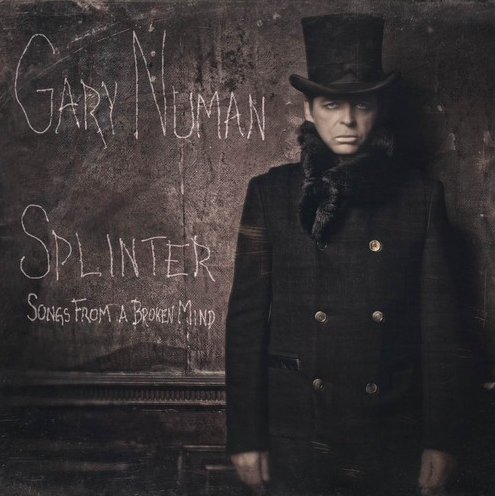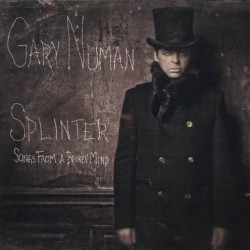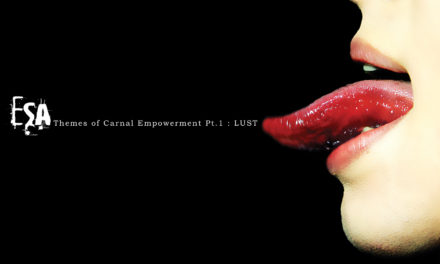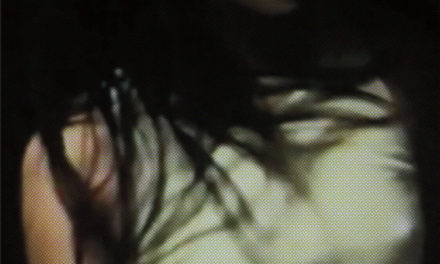Gary Numan
Splinter (Songs from a Broken Mind)
Mortal Records
There’s a new Gary Numan album, and the popular narratives surrounding its arrival are confused. That’s likely not a surprise: the surge of respect for Numan’s catalogue has reached a fever pitch over the last couple of years, with the popular tag of “the Godfather of Electro” being widely accepted, even amongst media outlets that had written him off for decades as a has-been (or even more blindly as a one-hit wonder). It’s hard to complain about that; as long-time initiates into the wonderful world of Numan (check the name in the header if you have any doubts) we’re pleased as all get out to see the man get his due. Sure it’s been decades since he was in the wilderness proper, but it’s still a charge to see a longtime hero get the hossanas they deserve.
A weird side-effect of his well deserved position within the electronic music canon is that Uncle Gary hasn’t been making music that jibes with that image for almost twenty years at this point. Oh sure, the dark rock music he’s been plying since 1994’s Sacrifice is definitely couched in the world of industrial rock and the attendant electronics that implies, but it’s a far cry from the quirky new wave and synthfunk of his eighties output. Perhaps inevitably, the clash of the image being peddled and the reality of his latter work has resulted in Splinter (Songs from a Broken Mind) being greeted with a certain amount of confusion from media outlets, who play off the discrepancy as if it’s a recent shift. Not so, and to not acknowledge just how long Numan has been doing heavy darkwave means you miss one of the most important things about Splinter, namely its place as part of a creative renaissance for the artist in question that is more obscure, but no less interesting to map.
Firstly, to dispense with some most common shorthand before it gets invoked, yeah there are a few moments here that sound like Nine Inch Nails, although nothing so glaring as the lift from The Fragile‘s “The Day the Whole World Went Away” that was the intro to 2011’s “The Fall”. These songs sound like Trent and company if that’s the only frame of reference you have for this style, otherwise they don’t particularly. Far more apt comparisons can be found within Numan’s own catalogue. The thick bass synth and syncopated cymbals of second single “Love Hurt Bleed” fall nicely in line with the sort of songs he was producing circa 2006’s Jagged, although the sustained chords that make up much of it’s body feel more elegant than the chugging six string riffage favoured in that era. That’s not to say that Numan has completely abandoned machined power chords, the verses of “Here in the Black” utilize them well, matching them with stabs of strings and as a counterpoint to some staccato whispered vocals.
Speaking of the vocals, Splinter marks the return of some of Gary’s more classic vocal stylings. With many of the renaissance albums being defined by a dynamic between raspy whispers and a controlled but fierce yell, the reintroduction of the backing choral vocals which marked so many classic joints is striking. “Splinter” recalling the vocal harmonization used to such wonderful effect on the chorus of a track no less venerable than “Telekon”. That such a callback is happening just as press organs only familiar with Gary’s earliest work are commenting on Splinter‘s dissimilarity from those records seems darkly ironic, but such is the cost of cult genius, perhaps.
For all the archival trainspotting we’re doing, there are still some new sounds and ideas to be found on Splinter. The eastern musical motifs that surface on the title track and the “The Calling” are well executed, their usage coinciding and intertwined with an increased proficiency on synthesized orchestral sounds. Gary and producer Ade Fenton have hinted at this stuff before, and the fathoms-deep production on “I Am Dust” prompted us to speculate that Splinter might be adorned with lusher arrangements, but to hear that tendency fully realized is reassuring: even fans as devout as us are willing to admit that the palette the two have relied on for years has occasionally lacked variation. “Splinter” feels especially alive and sensuous, the piano intoning a simple bass part as Numan’s singular voice is buffeted by washes of soundtrack strings.
Lyrically, we still have some of the expected post-Sacrifice motifs in the mix – irreligious proclamations, nightmares (both coming together wonderfully in “Here In The Black”) – but there also seems to be a sense of weary responsibility and accountability coming to the fore on “Everything Comes Down To This” and “The Calling”. If we were to play armchair psychologists we might speculate that this is the result of Gary integrating his experience as a father into his extant themes, the latter track in particular reading like a revisiting of the cautionary “keep your distance” messages of “Sleep By Windows” and “Please Push No More”. A similar blending of new experience with old beliefs comes in “Splinter”, with a litany of disbelief similar to that of “The Angel Wars” being met with a cryptic coda: “Life isn’t everything.” Regardless of origin, much like the aforementioned musical elements, it’s nice to have these new lyrical themes shaded into Gary’s work.
We’ve drawn comparisons between Splinter and several tracks from Telekon. While on one level that feels appropriate – with Telekon marking the introduction of more refined and grand production elements as well as frailer songs to Numan’s contemporary sound, not unlike Splinter – on another it feels like a reversal of that record’s marking of his public standing. Telekon found Numan incredibly uneasy with his near-overnight fame, and the touring for that record would eventually morph into a farewell jaunt as Numan announced his retirement, culminating in a legendary trio of Wembley shows. With Splinter, it seems as though a not insignificant portion of the public, critics and otherwise, who’ve remained clueless about the new dark material Numan has been hewing for decades, are finally shifting a broader spotlight back onto a man they’ve often treated as little more than a convenient name-drop. Die-hards like us can look askance such revisionism all we want, but happily this resurgence in interest is coinciding with a high watermark for this phase of Numan’s work. With a sonic palette as rich and varied as any he’s ever taken up, Splinter also bests just about all of the latter-era Numan records in terms of songwriting. Still innovating, still dark, still utterly necessary, Numan remains an indomitable presence. If his audience has grown with Splinter, so much the better.







I really liked this review. If anyone is interested, I did a super quick review over at The Cascade: http://ufvcascade.ca/2013/10/25/soundbites-gary-numan-paul-mccartney-four-tet-and-son-lux/